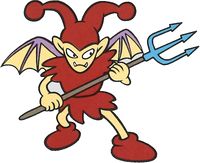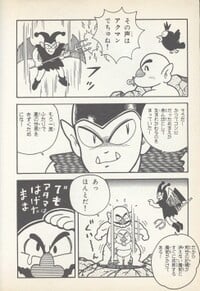Fauster
| Fauster | |
|---|---|
 Artwork from Wario's Woods (NES) | |
| Species | Devil |
| First appearance | Wario's Woods (NES) (1994) |
| Latest appearance | NES Remix 2 (2014) |
Fauster[1] is the first of the many bosses that Toad faces in Game B of the Round Game mode in the NES version of Wario's Woods. Fauster's name is likely derived from the titular character of the Faustian legend.
History[edit]
Wario's Woods[edit]
His boss battle takes place in the ninth round of the Game B mode. He is a purple, bat-winged, simian-like creature in red jester-like clothes who wields a pitchfork. Fauster has the ability to eliminate all bombs on-screen. Like the other bosses in the game, he is also able to relocate himself to different positions of the battlefield. If he re-materializes on Toad, Toad will be instantly defeated. He is also capable of summoning and throwing enemies around the stage.
Super Mario (KC Deluxe)[edit]
In the Super Mario manga, Fauster is the main antagonist of the Wario's Woods volume. Ages ago, Fauster was terrorizing the Peaceful Woods and all of its fairies, until a brave Toad defeated the demon and sealed in his underground temple hidden under a magic rock. A young Wario, escaping from the bees, finds the rock and manages to free Fauster, who only manifests as an incorporeal voice. To reward him, Fauster lends him his minions (the game's monsters) to grant any of his wishes, one of which is marrying Peach. Mario, aided by the clumsy fairy Wanda, armed with the helm of the Toad hero, tries to stop Wario. Needing a new body to take matters into his own hands, Fauster possesses Wario, but is once again sealed into stone by Wanda and Mario.
Some time later, Mario and Peach welcomes a newborn Luigi into the family, while Wario is reincarnated into a baby and later returns to Earth to free Fauster once again, finally in a physical form. After rewarding Wario by making him into an adult, Fauster now asks for a sacrifice to regain his full powers. Wario kidnaps Luigi and uses him as the sacrificing lamb. Fauster summons some of his minions and corrupts the fairy Diamond to turn them into stone (Wanda, however, manages to save herself having been recently banned from the fairy clan) and takes over the forest. Later, he summons four of his allies: Boom, Seizer, Mad, and lastly Drago. The four of them keep Mario and his friends distracted enough to conclude the sacrifice, and Fauster is reborn into the form of a giant demonic Luigi, and manages to conquer the entire world by summoning more of his monsters to completely flood the Earth with them. Mario, wearing the Toad hero's helm and aided by Peach and Wanda, grows bigger and defeats Fauster once and for all, saving Luigi and punishing Wario.
Super Mario-kun[edit]
Fauster only appears once in Super Mario-kun, in the Wario's Woods arc in volume 11. Fauster is the first enemy encountered by the heroes. He simply stabs Mario's bottom with his pitchfork and summons many monsters, which are ultimately defeated. Furious, Wario turns him into an anman (steamed hot buns that sounds similar to Fauster's Japanese name) and viciously munches on him in frustration, presumably killing him in the process as the narration suggests.
Gallery[edit]
It has been requested that more images be uploaded for this article. Remove this notice only after the additional images have been added. Specific(s): Fauster's powered-up color palette.
Names in other languages[edit]
| Language | Name | Meaning | Notes |
|---|---|---|---|
| Japanese | アクマン[2] Akuman |
Derived from「悪魔」(akuma, devil) and possibly "man" | |
| Italian | Fauster[3] | - |
References[edit]
| Wario's Woods (NES version, SNES version) | |
|---|---|
| Protagonists | Toad • Birdo • Sprite • Abata (Satellaview) |
| NES bosses | Fauster • Boom • Mad • Goro • Seizer • Drago • Fake Wario • Wario |
| SNES bosses | Katsini • Galrog • Harley Q • SamSpook • Sven • Parrotor • Mssr Boo • Aqualea • Razor • Tad Rock • Thak • Lizardon • Sarissa • Mangylox • Dedar • Carlton • Harry H • Wario |
| Enemies | Fuzz • Spud • Squeak • Beaker • Scram • Spook • Dovo • Thwomp • Pidgit |
| Items | Bomb • Coin • Diamond • Egg |
| Locations | Wario Castle • Wario's Woods |
| Miscellaneous | Gallery • Quotes • Staff |






